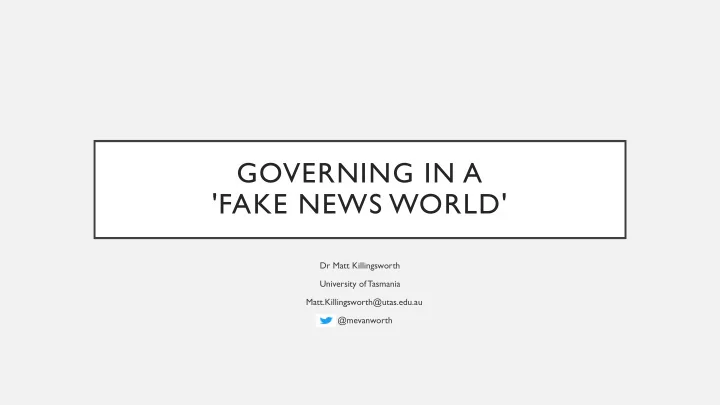

GOVERNING IN A 'FAKE NEWS WORLD' Dr Matt Killingsworth University of Tasmania Matt.Killingsworth@utas.edu.au @mevanworth
GOVERNING IN A 'FAKE NEWS WORLD'
IN THE BEGINNING…
POPULISM ‘Thin-centred ideology that considers society to be ultimately separated into two homogenous and antagonistic camps: ‘the pure people’ versus ‘the corrupt elite’, and argues that politics should be an expression of the general will of the people’
THE DEATH OF LIBERAL DEMOCRACY?
TRUST IN INSTITUTIONS total trust A lot of Some A little Don't No trust trust trust trust know Federal police 69% 29% 40% 19% 7% 5% State police 67% 25% 42% 23% 6% 4% The High Court 62% 23% 39% 23% 8% 6% The ABC 53% 15% 38% 26% 12% 9% The Reserve Bank 51% 15% 36% 31% 10% 8% Charitable 45% 8% 37% 36% 14% 5% organisations Environment groups 39% 8% 31% 34% 21% 7% Your local council 38% 5% 33% 37% 19% 5% The Commonwealth 36% 5% 31% 37% 16% 10% Public Service State Parliament 31% 5% 26% 32% 31% 6% Federal Parliament 30% 5% 25% 32% 33% 6% Religious 28% 5% 23% 27% 38% 6% organisations Trade unions 27% 5% 22% 30% 34% 9% Business groups 27% 3% 24% 44% 23% 7% Political parties 17% 3% 14% 34% 44% 6% Source: Essential Poll, January, 2017, http://essentialvision.com.au/?s=trust+in+institutions&searchbutton=Search
SOME FINAL THOUGHTS • A perfect storm of age-old phenomenon • So what? ‘Fake news’ not entirely new Core tenet of liberal democracies is an • • informed citizenry Nothing new in populism either • The breaking down of the post-war consensus • • What is new? creates new challenges for government A frustration with the liberal democratic • What is the relationship between decreasing • project faith/trust in core institutions and the capacity to govern? A breaking down of the post-war consensus • Populism: asks the right questions, but doesn’t • A rise in partisan politics • have the right answers Increased density of information •
Recommend
More recommend